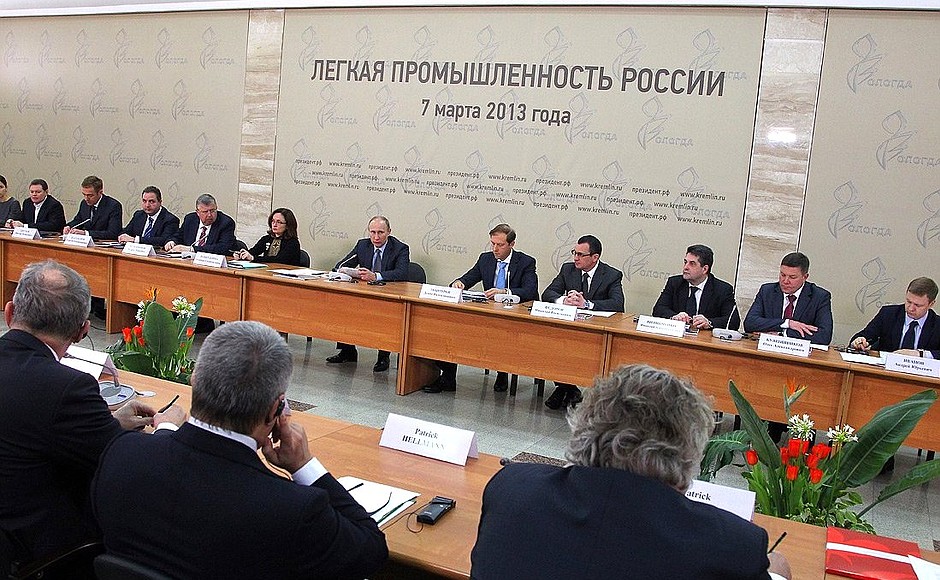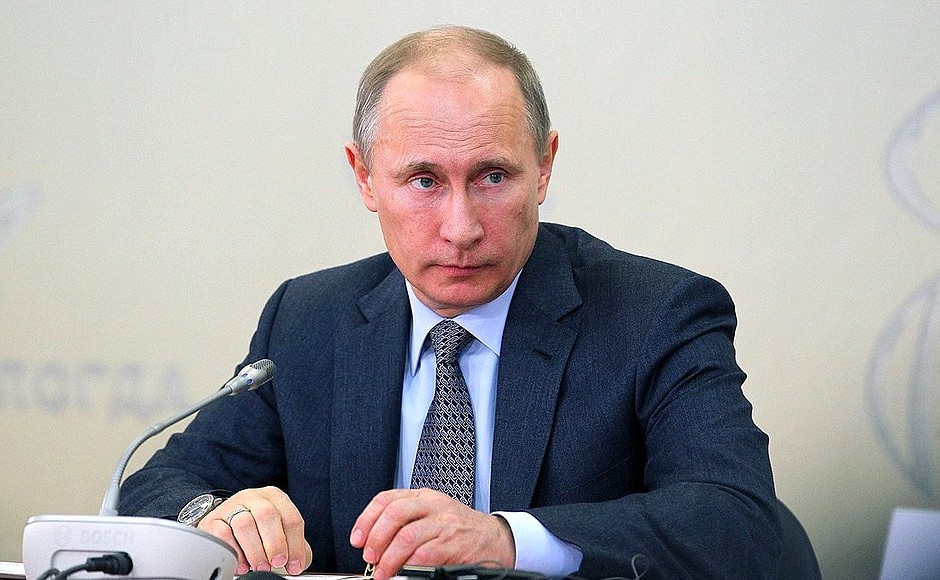See also
President of Russia Vladimir Putin: Good afternoon, colleagues,
Today we are meeting in Vologda, one of the traditional centres of Russia’s light industry, to discuss current problems in the sector. I have just paid a visit to one of the leading companies in Vologda (many of you have probably been there as well), where I talked with the employees and saw an exhibition of our light industry products. I must say that the rumours about the premature death of this industry are greatly exaggerated.
However, many problems remain, and that is why we are meeting here today – to talk about these issues. A great deal has already been done to create effective and high-paying jobs here, but, again, there are still many problems. The situation in light industry remains difficult.
Much of the resource base was lost in the period following the break-up of the Soviet Union. Many production facilities have become outdated. Nevertheless, we have seen some positive developments, as I said. There are new successful companies that are able to offer modern goods. Overall, light industry output has been constantly growing in recent years. But, unfortunately, there are no fundamental changes, and the most vivid indicator here is our own, internal, domestic Russian market, which is still dominated by imports, often of poor quality and dubious origin.
The light industry market is worth about 2.8 trillion rubles [over $90 billion]. It is a very large market but the share of Russian products is only about 25%. Approximately one third of the market — and this is particularly lamentable, — is occupied by illegally produced and illegally imported goods. That is a disaster, a real problem.
Counterfeit goods is one of the most painful topics for domestic light industry. The solution to this problem, first of all, demands the creation of a transparent and civilised environment in the industry. The workers asked me questions just now about Russia's accession to the World Trade Organisation. The fact that we joined this organisation is not a problem in itself, although we must certainly take it into account when we decide on the forms of state support for the industry; the worst problem is counterfeiting and smuggling. It is essential to ensure adequate conditions for the domestic industry, for investors and for the implementation of development projects.
”Counterfeit goods is one of the most painful topics for domestic light industry. The solution to this problem, first of all, demands the creation of a transparent and civilised environment in the industry.“
A number of measures are already being put into effect, as I have already said. A symbolic but very effective step was the closure of several major trade venues in Moscow, including the Cherkizovsky market, which supplied goods to all regions of the country.
The Interagency Commission on Combating Counterfeiting is operating on a permanent basis. The State Duma is currently examining a draft law which stipulates the destruction of confiscated goods. I ask the State Duma deputies to speed up the adoption of this law. Only decisive action can protect the industry from unfair competition. I believe that this practice should be extended to the entire Customs Union and we will discuss this issue with the leaders of Belarus and Kazakhstan. I am sure that the protection of national markets from unfair competition, from smuggling, all kinds of grey schemes and counterfeit goods is in the interest of all members of our integration association. The Customs Union gives us the opportunity to work together effectively in the fight against counterfeiting.
At the same time, combating illegal products is just one aspect of our work to support the industry. Obviously, Russia’s light industry has to develop more dynamically, to upgrade its fixed assets and significantly increase its productivity – I stress, significantly.
What is needed is a real breakthrough in the entire production chain, from raw materials production to the manufacture and sales of high quality, marketable products. It is important to clearly identify the niches where our businesses can take a strong position, and not only in Russia but also in foreign markets.
For example, we could look at such a promising field as special technical textiles. Just now, the colleagues at the exhibition demonstrated the opportunities in this area. In addition, demand is growing in medicine, construction, biotechnology and chemistry for natural, organic fabrics. We also have some solid achievements and good opportunities for development in these areas. We must certainly take advantage of them.
Next. The raw materials base for the industry is another important issue. Today cotton supply in Russia is totally dependent on imports. Wool supply is 85% import-dependent and the supply of chemical fibres – by about a third. Of course, some raw materials are not produced in Russia, and we have set zero customs and import duties for them. However, I am convinced that we must gradually develop our own raw materials base wherever possible and to continue to fund research aimed at the development and implementation of new technologies in this field.
Next systemic problem: we have to achieve significant improvements in the efficiency and effectiveness of support measures for the industry. We already have interest rate subsidies on loans for the purchase of raw materials and the modernisation of technology. The company we visited today has taken advantage of these support measures. The federal budget for the current year has almost doubled allocations for these purposes, to 865 million rubles. In 2012, the funding amounted to 472 million rubles [$16 million]. In addition, the federal budget has for the first time allocated 275 million rubles [$9 million] for the promotion of domestic light industry products in retail markets, as I have just told the workers. Naturally, the funding must reach the recipients on time and in full, without excessive red tape and bureaucracy.
At the same time, I want to note that banks are not very eager to issue loans to light industry enterprises. Sometimes they make excessive demands for collateral and issue only short-term loans for 1.5 or a maximum of 3 years. Unfortunately, the authorities show similar reluctance. For example, the decision to grant subsidies is made by the Industry and Trade Ministry for one year only. Mr Manturov [Minister of Trade and Industry] will probably tell us about plans to turn the situation around. However, such conditions do nothing to promote production modernisation or the implementation of promising investment projects.
”We have to achieve significant improvements in the efficiency and effectiveness of support measures for the industry. We already have interest rate subsidies on loans for the purchase of raw materials and the modernisation of technology. The state order is another significant support measure for Russia’s light industry.“
In this respect, I propose that we discuss providing long-term subsidies for the payment of interest on loans for the industry.
The state order is another significant support measure for Russia’s light industry. We talked about this in detail with colleagues at the exhibition earlier today. This mechanism takes on special importance in view of Russia's accession to the World Trade Organisation, especially since the conditions under which we joined it – and I want to stress this – allow us to place 100% of state and municipal orders with domestic producers. That is, during the accession talks, we secured the right to place state orders entirely with domestic producers.
However, the specifications and quality standards of the goods raise serious questions in most ministries and state-owned companies. There is no discipline and there is fertile ground for all kinds of abuse. At the same time, honest suppliers and manufacturers of quality products often have no opportunity to offer their goods for the state order.
We must establish clear and transparent contract terms and requirements for bidders, and think about introducing long-term state contracts.
This will make the operation of domestic enterprises more stable, both in terms of ongoing activities and investment projects.
I would like to draw your attention to another important matter. The State Council meeting at the end of December 2012 again raised the issue of going back to school uniforms. Today we saw some very good samples. Of course, the main objective here is to make sure that all children, regardless of family income, had comfortable and affordable uniforms. It would be excellent if these solutions could be offered by Russian companies. Therefore, I hope to see your initiatives and in general your active and involved participation in this work. There are great many proposals, as we saw at the exhibition today, and they are very attractive and affordable.
The industry’s personnel policy must be a key priority. I suggest that today we take a look at the steps that are required to restore professional training for light industry, to create specialised competence centres in the regions and to ensure the effective use of specialised research institutes and universities.

